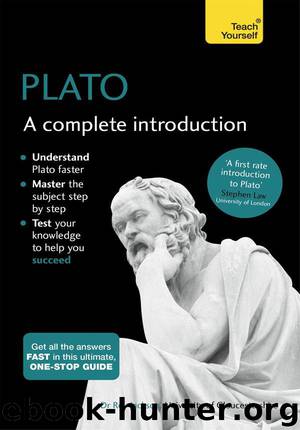Plato by Roy Jackson

Author:Roy Jackson
Language: eng
Format: azw3, epub
Tags: A Complete Introduction
ISBN: 9781473601802
Publisher: Hodder & Stoughton
Published: 2016-03-10T05:00:00+00:00
The true philosopher
‘With any seed or growing thing,’ I [Socrates] said, ‘no matter whether it’s a plant or an animal, we know that if it hasn’t had the particular nourishment that’s appropriate to it, or the right weather, or location, the more vigorous specimen it is the greater the number of ways it will fail; bad, I think, is more opposed to good than it is to something that’s merely not good.’
Plato, Republic, 491d
Having presented these parables or similes, Plato has hoped to show why the philosopher is seen as worthless to society. In the simile of the ship the philosopher is the star-gazing navigator, while in the beast simile he would not be appreciated by the animal because he does not allow it to do as it wished. In Athenian society, nobody likes a know-all even if, as a result, the ship of state ends up sinking in the middle of the ocean, or the beast dies at an early age of an avoidable heart attack.
In the corrupt city that was Athens, the philosophers are perceived as useless rogues, and here Socrates is making a strong case for the influence of society upon a person’s character. Remember that for Plato – and for most Greeks – the individual was an integral part of society. If the community as a whole is corrupt then this is bound to affect the individual within that community.
Further, Plato argues, it is true of any growing thing that those of the finest nature suffer more from evils done to them than those of an average nature. The ‘philosophic nature’ is something inherent in certain individuals; a powerful force for good that, however, can be manipulated as a force for bad. A Jedi knight can become Obi-Wan Kenobi or Darth Vader! For example, a dog can be brought up to be useful to society, perhaps as a guide dog or a sniffer dog, or as a companion for the elderly. However, the same dog, if given a bad upbringing, could be vicious, attacking postmen and biting the hand that feeds it. The philosopher, ultimately, cannot be educated according to standards different from the community he is a part of. Should he ever recall his philosophical nature and wish to pursue philosophy once more, the peer pressure will be so great he will be compelled to put aside this yearning.
The ‘common people’ would not approve of true philosophy and will pressure those with the talents of a philosophic nature (courage, intellect, self-control, etc.) to use their skill for other goals, perhaps in business or entertainment. A modern-day analogy might be a talented poet who is compelled to write advertising slogans for a living because society has little patience or understanding of poetry. Plato argues that the reputation that philosophy has for intellectual vigour and wisdom will remain, but, in the unscrupulous society, will attract rogues who, like the simile of the ship, declare themselves navigators but have little or no knowledge of navigation.
However, there will always
Download
This site does not store any files on its server. We only index and link to content provided by other sites. Please contact the content providers to delete copyright contents if any and email us, we'll remove relevant links or contents immediately.
The remains of the day by Kazuo Ishiguro(8959)
Tools of Titans by Timothy Ferriss(8356)
Giovanni's Room by James Baldwin(7309)
The Black Swan by Nassim Nicholas Taleb(7095)
Inner Engineering: A Yogi's Guide to Joy by Sadhguru(6780)
The Way of Zen by Alan W. Watts(6587)
Asking the Right Questions: A Guide to Critical Thinking by M. Neil Browne & Stuart M. Keeley(5745)
The Power of Now: A Guide to Spiritual Enlightenment by Eckhart Tolle(5737)
The Six Wives Of Henry VIII (WOMEN IN HISTORY) by Fraser Antonia(5492)
Astrophysics for People in a Hurry by Neil DeGrasse Tyson(5172)
Housekeeping by Marilynne Robinson(4429)
12 Rules for Life by Jordan B. Peterson(4294)
Double Down (Diary of a Wimpy Kid Book 11) by Jeff Kinney(4256)
The Ethical Slut by Janet W. Hardy(4235)
Skin in the Game by Nassim Nicholas Taleb(4229)
Ikigai by Héctor García & Francesc Miralles(4228)
The Art of Happiness by The Dalai Lama(4118)
Skin in the Game: Hidden Asymmetries in Daily Life by Nassim Nicholas Taleb(3983)
Walking by Henry David Thoreau(3945)
